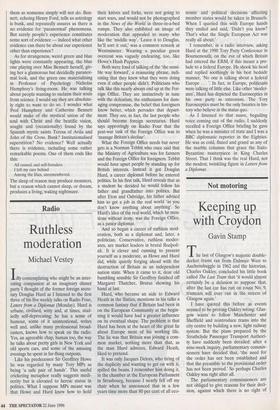Radio
Ruthless moderation
Michael Vestey
Idly contemplating who might be an inter- esting companion at an imaginary dinner party I thought of the former foreign secre- tary Douglas Hurd as I listened to the first three of his five weekly talks on Radio Four, Letters from a Diplomat (Monday). Hurd is urbane, civilised, witty and, at times, stud- iedly self-deprecating; he has a sense of humour, some of it unintentional, writes well and, unlike many professional broad- casters, knows how to speak on the radio. Yes, an agreeable chap, human too, the way he talks about pretty girls in New York and old sports cars, and some of the amusing evenings he spent in far-flung outposts.
Like his predecessor Sir Geoffrey Howe he was regarded by many Tory MPs as being 'a safe pair of hands'. This useful cricketing metaphor really suggests medi- ocrity but is elevated to heroic status in politics. What I suppose MPs meant was that Howe and Hurd knew how to hold their knives and forks, were not going to start wars, and would not be photographed in the News of the World in three-in-a-bed romps. They also exhibited an image of moderation that appealed to many who like the 'middle way'. 'Leave it to Douglas, he'll sort it out,' was a common remark at Westminster. Wearing a peculiar green overcoat was vaguely endearing, too, like Howe's Hush Puppies.
Both were fond of talking of the 'the sensi- ble way forward', a reassuring phrase, indi- cating that they knew what they were doing even if other people didn't. Politicians who talk like this nearly always end up at the For- eign Office. They are instinctively in tune with the defeatism, the enthusiasm for dam- aging compromise, the belief that foreigners know better, which pervades that depart- ment. They are, in fact, the last people who should become foreign secretaries. Hurd says approvingly on Radio Four that the post-war task of the Foreign Office was to `manage Britain's decline'.
What the Foreign Office needs but never gets is a Norman Tebbit who once said that the Ministry of Agriculture was for farmers and the Foreign Office for foreigners. Tebbit would have upset people by standing up for British interests. Instead it got Douglas Hurd, a career diplomat before he entered politics. In his first talk, Hurd reveals that as a student he decided he would follow his father and grandfather into politics. But after Eton and Oxbridge, his father advised him to get a job in the real world 'as you don't know anything about anything'. So Hurd's idea of the real world, which he men- tions without irony, was the Foreign Office, as a junior diplomat.
And so began a career of ruthless mod- eration, both as a diplomat and, later, a politician. Conservative, ruthless moder- ates, are market leaders in brutal Realpoli- tik. It is clever and cunning to present yourself as a moderate, as Howe and Hurd did, while quietly forging ahead with the destruction of Britain as an independent nation state. When it came to it, dear old bumbling sensible Sir Geoffrey finished off Margaret Thatcher, Brutus showing his hand at last.
Hurd, who became an aide to Edward Heath in the Sixties, mentions in his talks a common fantasy that if Britain had been in on the European Community at the begin- ning it would have had a greater influence on its eventual shape. The problem is that Hurd has been at the heart of the great lie about Europe most of his working life. The lie was that Britain was joining a com- mon market, nothing more than that, as the man Hurd admires, Edward Heath, liked to pretend.
It was only Jacques Delors, who tiring of the duplicity and wanting to get on with it, spilled the beans. I remember him doing it, in the chamber at the European Parliament in Strasbourg, because I nearly fell off my chair when he announced that in a few years time more than 80 per cent of all eco- nomic and political decisions affecting member states would be taken in Brussels. When I queried this with Europe hands they smiled and said, 'Didn't you know? That's what the Single European Act was really all about.'
I remember, in a radio interview, asking Hurd at the 1990 Tory Party Conference in Bournemouth, on the eve of which Britain had entered the ERM, if this meant a pre- lude to a federal Europe. He shook his head and replied soothingly in his best bedside manner, 'No one is talking about a federal Europe . . . In fact, in Europe, politicians were talking of little else. Like other 'moder- ates', Hurd has depicted the Eurosceptics in his own party as extremists. The Tory Eurosceptics must be the only fanatics in his- tory who believe in the status quo.
As I listened to that suave, beguiling voice coming out of the radio, I suddenly recalled a Foreign Office briefing he gave when he was a minister of state and I was a BBC diplomatic reporter in the Eighties. He was as cold, fluted and grand as any of the marble columns that grace the Italo- Byzantine masterpiece in King Charles Street. That I think was the real Hurd, not the modest, twinkling figure in Letters from a Diplomat.


























































 Previous page
Previous page